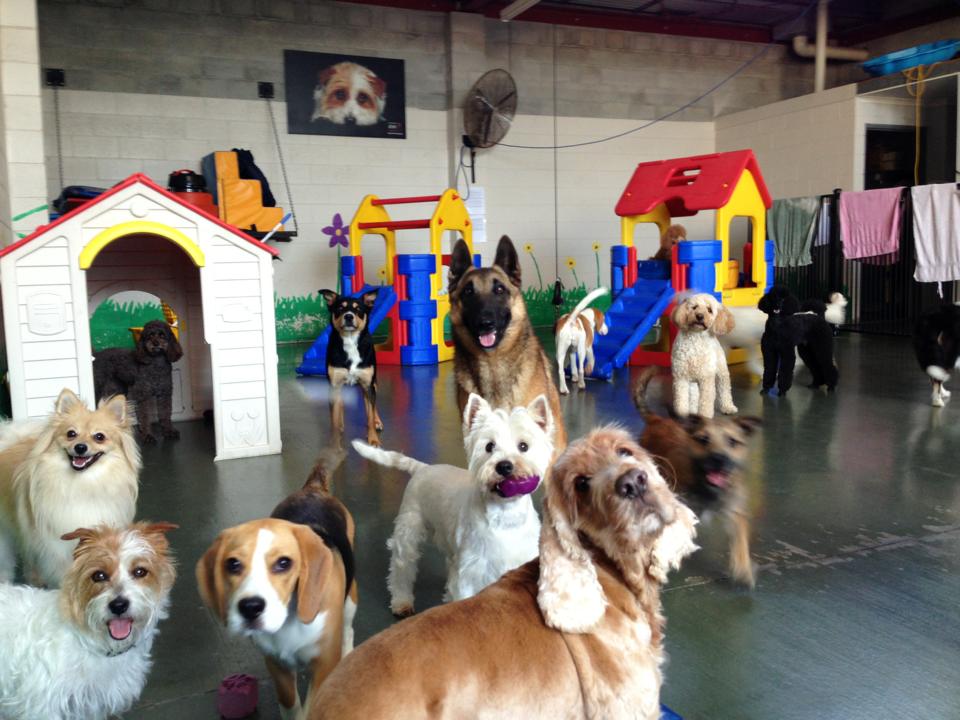Introduction
Dogs are creatures of habit—but their behavior is also shaped by the environments they spend time in. Beyond exercise and play, the daily routines and interactions dogs experience contribute to how they respond to change, build social skills, and handle stress.
Modern pet care services like dog daycare and dog boarding do more than just fill in the gaps when owners are unavailable. They create structured, enriched environments where dogs learn to navigate new settings, interact with peers, and build confidence—all of which influence long-term behavior in meaningful ways.
At Sweet Paws Retreat, the goal goes beyond simple care. Every interaction during daycare or boarding is a chance to reinforce good habits, teach appropriate social responses, and help dogs develop emotional resilience.
The Role of Structure in Behavioral Development
Dogs thrive on routine because it gives them a sense of predictability and control. When they know what to expect, they are less likely to become anxious, reactive, or overwhelmed. Both daycare and boarding offer consistent scheduling—something that many home environments struggle to maintain.
Why Routine Matters:
- Regular mealtimes and nap times help regulate energy levels
- Scheduled play breaks reduce hyperactivity and destructive behavior
- Predictability promotes calmness, especially in high-energy breeds
Structured environments also support basic impulse control. Dogs that learn to wait their turn, follow cues, or rest during quiet periods begin to carry those behaviors into other settings—including the home.
Social Exposure: Beyond Just Play
Socialization isn’t just for puppies. Dogs at all life stages benefit from regular, well-managed social interactions. Dog daycare introduces dogs to others of varying sizes, energy levels, and personalities in a controlled setting, allowing them to develop more nuanced social skills.
Long-Term Benefits of Social Time:
- Reduces reactivity to unfamiliar dogs and people
- Promotes tolerance for shared resources and space
- Helps prevent fear-based aggression or defensiveness
Importantly, the presence of trained staff in daycare ensures that these interactions remain positive. Dogs are redirected or guided as needed, which helps reinforce appropriate behavior and prevent bad habits from forming.
Confidence Through Exposure
One of the most underrated advantages of dog boarding is how it helps dogs become more adaptable. Many dogs are naturally wary of new environments, unfamiliar smells, or different surfaces. But repeated exposure—under safe, supervised conditions—builds confidence.
Situations That Build Resilience:
- Navigating a new room or yard
- Eating meals away from home
- Settling into a kennel or crate with unfamiliar sounds
Rather than fear, confident dogs learn to explore. This makes them better suited to handle vet visits, car rides, travel, and even the presence of new guests in the home. Boarding prepares them for change by reinforcing calmness in the face of novelty.
Mental Stimulation and the Prevention of Boredom Behaviors
Boredom is a major contributor to unwanted behaviors at home. Chewing furniture, digging holes, barking at nothing—these behaviors often stem from mental under-stimulation. Dog daycare helps prevent this by incorporating enrichment throughout the day.
Types of Enrichment That Matter:
- Rotating toys and textures
- Obstacle courses or puzzle feeders
- Staff-guided games that require focus and control
These activities engage the brain, not just the body. Over time, dogs that are regularly stimulated in this way show improved focus and lower instances of compulsive behavior like tail-chasing or obsessive licking.
Controlled Separation and Attachment Training
Many dogs struggle with separation anxiety, especially in a post-pandemic world where routines have drastically changed. Daycare and short-term boarding gently teach dogs that being apart from their owners isn’t something to fear.
How It Helps:
- Short stays mimic brief absences and create positive associations
- Gradual increases in time away ease the transition to longer stays
- Dogs learn to form healthy bonds with other people and animals
Instead of clinging to a single person, dogs become emotionally well-rounded. They understand that departures are temporary and that they can be safe, entertained, and cared for even when their family isn’t nearby.
Group Settings and Behavioral Observation
Unlike home environments, group settings give staff a chance to observe how dogs behave across a range of scenarios. From how they greet others to how they respond to new stimuli, these observations offer insight into behavioral trends that may otherwise go unnoticed.
Behavioral Insights Gained:
- Sensitivities to certain dog types or stimuli
- Signs of stress, under-confidence, or hyperarousal
- Emerging behavioral patterns like guarding or excessive vocalizing
Professional care staff can often detect and alert owners to issues before they escalate. With early identification, training and behavioral interventions become more effective and less reactive.
Age-Specific Impact: Puppies, Adults, and Seniors
Different life stages benefit from daycare and boarding in different ways. Puppies gain social foundations. Adults maintain balanced behaviors. Seniors enjoy mental and emotional engagement that helps them stay sharp.
Breakdown by Stage:
- Puppies: Learn appropriate bite inhibition, play manners, and independence
- Adults: Prevent stagnation in behavior, support agility and problem-solving
- Seniors: Maintain mobility and avoid isolation or separation anxiety
Care should always be tailored to energy levels and physical limitations, but across the board, dogs benefit from structured engagement at any age.
The Big Picture: A Lifelong Impact
Dogs are constantly learning, even when we’re not actively training them. Their environments shape their responses, and repeated exposure to consistent, positive routines creates behavioral blueprints that last.
Dog daycare and boarding aren’t simply services—they’re developmental environments. They give dogs tools to handle stress, adapt to change, and engage more confidently with the world.
Sweet Paws Retreat integrates behavioral awareness into every part of the care process. Whether it’s through gentle introductions during daycare or supportive structure during boarding stays, the goal is always the same: to help dogs grow into the best version of themselves.
Conclusion
Every day your dog spends in a thoughtful, well-managed environment contributes to their long-term behavior. Structured routines, guided socialization, and exposure to new experiences all play a role in shaping how they respond to the world around them.
Dog daycare and dog boarding aren’t just temporary solutions—they’re valuable investments in your dog’s emotional and behavioral health. From increased confidence to reduced anxiety, the benefits are far-reaching and lasting.
Sweet Paws Retreat helps support this growth by offering consistent, safe, and enriching care environments where dogs don’t just pass the time—they thrive.







